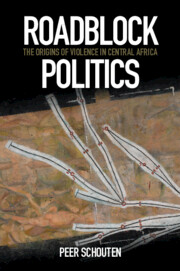Book contents
- Roadblock Politics
- Roadblock Politics
- Copyright page
- Epigraph
- Contents
- Figures
- Maps
- Tables
- Preface and Acknowledgements
- 1 Introduction: Sovereignty on a Shoestring
- Part I A Prehistory of the Roadblock
- Part II Roadblock Politics
- 5 La route, ça coûte: Roadblock Geographies
- 6 The Supply Chain Frontier
- 7 CAR: War of Roads
- 8 Non-conventional Logistics
- 9 Transparency Goes to War
- Conclusions
- Bibliography
- Index
9 - Transparency Goes to War
from Part II - Roadblock Politics
- Roadblock Politics
- Roadblock Politics
- Copyright page
- Epigraph
- Contents
- Figures
- Maps
- Tables
- Preface and Acknowledgements
- 1 Introduction: Sovereignty on a Shoestring
- Part I A Prehistory of the Roadblock
- Part II Roadblock Politics
- 5 La route, ça coûte: Roadblock Geographies
- 6 The Supply Chain Frontier
- 7 CAR: War of Roads
- 8 Non-conventional Logistics
- 9 Transparency Goes to War
- Conclusions
- Bibliography
- Index
Summary
Focusing on coltan, Chapter 9 describes how increasingly complex global commodity chains became entangled with conflict in Central Africa. For the majority of consumers of electronics downstream, most of what happens in Central Africa remains out of sight and out of mind. But the violence of supply chains now reaches into many corners of that region, casting people in the dangerous role of foot soldiers of globalization in a context where the wealth they carry is often violently contested. This chapter shows how the disaggregated and patchwork-like nature of global supply chains makes them ideally suited to latch onto eastern Congo’s equally dispersed and fragmented artisanal mining economy. Today’s mineral supply chains, unlike their twentieth-century predecessors, are able to accommodate -- indeed work through -- forms of ordered anarchy such as are found in contemporary Central Africa. In accommodating local forms of violence and competing claims to order-making, they more closely resemble the fragmented political order that emerged around the pre-colonial caravan trade than colonial-era systems of monopolies on the extraction and long-distance conveyance of minerals. However much ongoing supply chain initiatives promise corridor-like, closed-pipeline solutions, they will always remain leakier than the integrated industrial extractive machineries they replaced.
- Type
- Chapter
- Information
- Roadblock PoliticsThe Origins of Violence in Central Africa, pp. 232 - 256Publisher: Cambridge University PressPrint publication year: 2022



